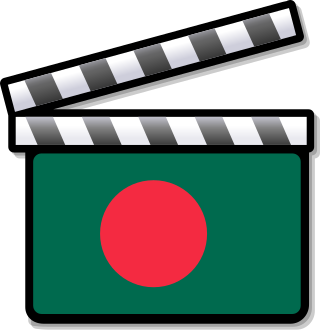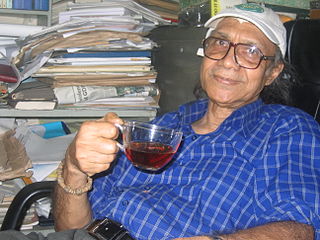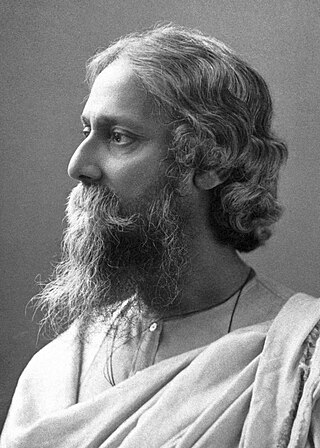Related Research Articles

The Bangladesh Liberation War was a revolution and armed conflict sparked by the rise of the Bengali nationalist and self-determination movement in East Pakistan, which resulted in the independence of Bangladesh. The war began when the Pakistani military junta based in West Pakistan—under the orders of Yahya Khan—launched Operation Searchlight against the people of East Pakistan on the night of 25 March 1971, initiating the Bangladesh genocide.

Humayun Ahmed was a Bangladeshi novelist, dramatist, screenwriter, filmmaker, songwriter, scholar, and professor. His breakthrough was his debut novel Nondito Noroke published in 1972. He wrote over 200 fiction and non-fiction books. He was one of the most popular authors and filmmakers in post-independence Bangladesh. Dawn referred to him as the cultural legend of Bangladesh.

Shamsur Rahman was a Bangladeshi poet, columnist and journalist. A prolific writer, Rahman produced more than sixty books of poetry collection and is considered a key figure in Bengali literature from the latter half of the 20th century. He was regarded as the unofficial poet laureate of Bangladesh. Major themes in his poetry and writings include liberal humanism, human relations, romanticised rebellion of youth, the emergence of and consequent events in Bangladesh, and opposition to religious fundamentalism.

The Bangladeshi Cinema or, Bangla Cinema or, Bengali Cinema, better known as Dhallywood, is the Bengali-language film industry based in Dhaka, Bangladesh. It has often been a significant film industry since the early 1970s. The dominant style of Bangladeshi cinema is melodramatic cinema, which developed from 1947 to 1990 and characterizes most films to this day. Cinema was introduced in Bangladesh in 1898 by the Bradford Bioscope Company, credited to have arranged the first film release in Bangladesh. Between 1913 and 1914, the first production company, Picture House, was opened. A 1928 short silent film titled Sukumari was the first Bengali-produced film in the region. The first full-length film, The Last Kiss, was released in 1931.

Abdul Mannan Syed was a Bangladeshi poet, and critic. He is known for his considerable research works on Kazi Nazrul Islam, Jibanananda Das, Farrukh Ahmad, Syed Waliullah, Manik Bandyopadhyay, Bishnu De, Samar Sen, Roquiah Sakhawat Hossain, Abdul Ghani Hazari, Muhammad Wajed Ali, Prabodh Chandra Sen. From 2002 to 2004, he had been the executive director of Nazrul Institute.

Bengali novels occupy a major part of Bengali literature. Despite the evidence of Bengali literary traditions dating back to the 7th century, the format of novel or prose writing did not fully emerge until the early nineteenth century. The development of Bengali novel was fueled by colonial encounter, booming print culture, growth of urban centers, and increased middle-class readership Upanyas, the Bangla word for novel, is derived from the words upanay and upanyasta.

Fakir Alamgir was a Bangladeshi folk and pop singer.

Muntasir Mamoon his full name is Muntasir Uddin Khan Mamun, he is a Bangladeshi writer, historian, scholar, secularist, translator, and professor at University of Dhaka. He was awarded Bangla Academy Literary Award and Ekushey Padak by the Government of Bangladesh.

There have been numerous works of art created as a result of the Bangladesh Liberation War. In 1971, a concert was organized by members of the British rock band, The Beatles, in support of Bangladesh. The songs recorded for and broadcast on Swadhin Bangla Betar Kendra are still considered to be the best of Bangladeshi protest songs.

Nachiketa Chakraborty, simply known as Nachiketa, is an Indian singer, songwriter, musician, composer and playback singer who is known for his modern Bengali lyrics. He achieved fame in the early 1990s, with the release of his debut album Ei Besh Bhalo Achi.

Andrew Kishore Kumar Baroi was a Bangladeshi playback singer. He is considered as the "Playback King" of Bangladesh music industry who sang more than 15 thousands songs. He sang for more than 100 Bangladeshi films. He was also one of the judges of 2013 Bangladeshi Idol.

Samina Chowdhury is a Bangladeshi singer. She mostly sings modern and classical songs. Her notable songs include Jonmo Theke Jolchi Mago, Amar Buker Moddhyekhane, Amar Dui Chokhe Dui Nodi, Ekbar Jodi Keu, Kobita Porar Prohor and Phool Phote Phool Jhore.

Kabir Bakul is a Bangladeshi lyricist and journalist. He won the Bangladesh National Film Award for Best Lyrics 6 times for the films Megher Kole Rod (2008), Swami Strir Wada (2009), Nisshash Amar Tumi (2010), Purno Doirgho Prem Kahini (2013), Nayok (2018) and Bishwoshundori (2020). As of 2013, he has written about 5000 songs.
This is a list of Muhammad Zafar Iqbal's work.

Gazi Mazharul Anwar was a Bangladeshi film director, producer, lyricist, screenwriter and music director. He earned the Bangladesh National Film Award for Best Lyricist a record seven times for the films Tit for Tat (1992), Ajante (1996), Churiwala (2001), Lal Dariya (2002), Kokhono Megh Kokhono Brishti (2003), Meyeti Ekhon Kothay Jabe (2016) and Joiboti Konyar Mon (2021). He worked as a lyricist in the "Swadhin Bangla Betar Kendra". He was awarded Ekushey Padak in 2002 and Independence Day Award in 2021 by the government of Bangladesh. He has penned lyrics for 267 films.
Moniruzzaman Monir is a Bangladeshi music composer. He won Bangladesh National Film Award for Best Lyrics three times in 1988, 1989 and 1990. He was awarded Ekushey Padak in 2004 by the Government of Bangladesh. He has written songs for 196 films.
Tele Samad was a Bangladeshi actor. He acted in over 600 films.
Kazi Md. Ali Balam Jahangir, famously known as Balam, is a Bangladeshi singer, guitarist, composer, and music producer. He was born in Dhamaron village in Tongibari Upazila of Munshiganj (Bikrampur) district. He used to be the lead guitarist/vocalist for the band Warfaze. Later he introduced himself as a solo singer.
Masum Babul was a Bangladeshi film dance director and choreographer. He won the Bangladesh National Film Award for Best Choreography twice, for the film Dola (1993) and Ki Jadu Karila (2008). He is also best known for the films Beder Meye Josna (1989), Koti Takar Kabin (2006), and Bikkhov (1994). Babul died on 6 March 2023, at age 60.
References
- ↑ Nationalism or Islam: Indo-Pakistan episode. January 1984.